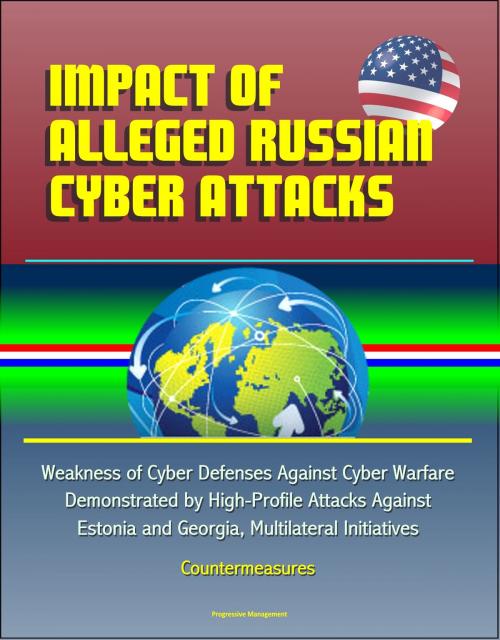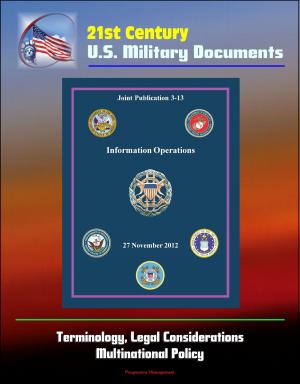Impact of Alleged Russian Cyber Attacks: Weakness of Cyber Defenses Against Cyber Warfare Demonstrated by High-Profile Attacks Against Estonia and Georgia, Multilateral Initiatives, Countermeasures
Nonfiction, Computers, Networking & Communications, Computer Security, Operating Systems, History, Asian, Russia| Author: | Progressive Management | ISBN: | 9781370931019 |
| Publisher: | Progressive Management | Publication: | March 22, 2017 |
| Imprint: | Smashwords Edition | Language: | English |
| Author: | Progressive Management |
| ISBN: | 9781370931019 |
| Publisher: | Progressive Management |
| Publication: | March 22, 2017 |
| Imprint: | Smashwords Edition |
| Language: | English |
This excellent report has been professionally converted for accurate flowing-text e-book format reproduction. High profile cyber attacks against Estonia and Georgia have brought the subject of cyber security from the realm of internet magazines to main stream media outlets. The cyber attacks advanced the perceptions of animosity between the Russian Federation and former Soviet satellites. The cyber attacks that have occurred in the last few years have shown the vulnerabilities of using the internet and the weaknesses of cyber defenses. The international framework, either through regional organization such as the North Atlantic Treaty Organization (NATO) and the European Union (EU), or through international organizations such as the United Nations (UN), has been inadequate for preventing cyber attacks for political purposes or for bringing cyber criminals to justice. There is little concrete proof of involvement of the Russian Federation government in any cyber attacks. The circumstantial evidence does lead to the perception that the Russian government was behind or supported recent cyber attacks. When countries or organizations stand in opposition to Russia they are likely to receive a cyber attack in order to influence their position. The high likelihood of future cyber attacks, the ease of conducting cyber attacks, and the amount of networks to conduct the attacks make this monograph relevant for study. Government and organizational leaders need to ensure that their cyber defenses are ready to protect private information, internet services, and electrical grids that rely on internet technology to function. Former Soviet satellites, the United States, and international organizations need to strive to increase international co-operation in order to defeat cyber crime. Without a legal international framework cyber criminals will continue to operate in areas where there are no laws or agreements concerning cyber security. Nations can build their own defenses but co-operation and the sharing of technical data will enable a safer internet environment for everyone. The computer user can be the weakest link in an Information Technology (IT) structure. Individuals must ensure that they are following best computer practices in order to accept the responsibility of being the first line of defense against future cyber attacks.
This excellent report has been professionally converted for accurate flowing-text e-book format reproduction. High profile cyber attacks against Estonia and Georgia have brought the subject of cyber security from the realm of internet magazines to main stream media outlets. The cyber attacks advanced the perceptions of animosity between the Russian Federation and former Soviet satellites. The cyber attacks that have occurred in the last few years have shown the vulnerabilities of using the internet and the weaknesses of cyber defenses. The international framework, either through regional organization such as the North Atlantic Treaty Organization (NATO) and the European Union (EU), or through international organizations such as the United Nations (UN), has been inadequate for preventing cyber attacks for political purposes or for bringing cyber criminals to justice. There is little concrete proof of involvement of the Russian Federation government in any cyber attacks. The circumstantial evidence does lead to the perception that the Russian government was behind or supported recent cyber attacks. When countries or organizations stand in opposition to Russia they are likely to receive a cyber attack in order to influence their position. The high likelihood of future cyber attacks, the ease of conducting cyber attacks, and the amount of networks to conduct the attacks make this monograph relevant for study. Government and organizational leaders need to ensure that their cyber defenses are ready to protect private information, internet services, and electrical grids that rely on internet technology to function. Former Soviet satellites, the United States, and international organizations need to strive to increase international co-operation in order to defeat cyber crime. Without a legal international framework cyber criminals will continue to operate in areas where there are no laws or agreements concerning cyber security. Nations can build their own defenses but co-operation and the sharing of technical data will enable a safer internet environment for everyone. The computer user can be the weakest link in an Information Technology (IT) structure. Individuals must ensure that they are following best computer practices in order to accept the responsibility of being the first line of defense against future cyber attacks.















